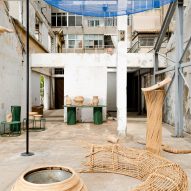Reflective surfaces, geometric shapes and animal prints nod to Beirut’s artwork deco heritage at this speakeasy, which native studio Carl Gerges Architects has designed as a haven for town’s residents.
Clubroom is positioned in a Thirties constructing on Pasteur Avenue, one of many oldest thoroughfares within the Lebanese capital lined with buildings within the “moderne” fashion that was standard on the time.

Architect Carl Gerges drew on this structure when conceptualising the inside, which options artwork deco parts together with geometric wall appliqués, a structured chandelier and stools upholstered in leopard-print cloth.
The transient for the challenge, which Gerges designed for a longtime consumer, was for “a hidden house that felt valuable, like a hidden gem ready to be found”.

The speakeasy idea was proposed from the outset however took on elevated significance following Israel’s current army marketing campaign on Lebanon, which Gerges mentioned gave the challenge “a extra symbolic which means”.
“The disaster truly gave us the drive to push ahead and full the challenge,” he mentioned. “The truth that it was a hidden membership made it much more distinctive as, in occasions of conflict, folks search hope and solace inside trusted circles.”

The membership, which may seat roughly 50 visitors, is tucked away on the rear of the constructing and its compact dimensions knowledgeable the usage of reflective surfaces to create the phantasm of a bigger house.
Friends enter alongside a hall the place inexperienced velvet curtains and mirrored ceilings create a way of intrigue. The hall leads in direction of a reception desk made out of lacquered rosewood that produces light reflections.

Gerges claimed that the deep hues and reflective surfaces used all through the inside goal to “evoke a way of indulgence and privateness, providing a haven from town’s risky local weather”.
The principle bar space options partitions coated in inexperienced velvet, with alabaster lighting fixtures designed by early Twentieth-century architect Pierre Chareau illuminating the house.
A key function of the room is the monumental granite bar, which is polished so its black surfaces replicate loads of mild. A wall of angled mirrors behind the bar creates the phantasm of depth whereas producing intriguing fragmented reflections.

“Our thought for the house was actually to work with various kinds of reflective surfaces as a result of the positioning is so tiny and the mirrors and glossy granite all assist optically multiply its proportions,” mentioned Gerges.
“Aesthetically it made the place actually really feel prefer it was a gem, glamorous and bejewelled,” he added. “The supplies additionally served the bar effectively when it comes to acoustics as a result of they break up the reverberating sound waves.”
The entire furnishings and joinery was custom-made by native artisans and carpenters, partly as a consequence of Beirut’s airport working at restricted capability in the course of the conflict.

Inexperienced banquette seating traces the room’s perimeter, whereas excessive stools upholstered in ochre bouclé cloth are positioned subsequent to tables organized to direct consideration in direction of the bar.
Supplies used all through the house had been chosen for each their aesthetic and acoustic properties, which assist to create an environment suited to stress-free and listening to music.
Gerges describes the bar as a “refuge of refined escapism” from the stresses of on a regular basis life in Beirut following the current battle, with its richly adorned inside evoking a golden age of glamour.
Carl Gerges grew up in Beirut and graduated with a level in structure from town’s American College, the place he additionally co-founded a profitable musical group known as Mashrou Leila.

Israel’s most up-to-date army marketing campaign noticed Lebanon face its most intense assaults in a number of a long time, coming scorching on the heels of a devastating financial disaster and a disastrous explosion within the capital’s port.
However Lebanese designers have advised Dezeen they’re hopeful in regards to the prospect of constructing again higher.
“Whereas we have rebuilt bodily many occasions, rebuilding basically as one united folks is a problem now we have but to totally undertake,” mentioned We Design Beirut founder Mariana Wehbe.
“For the primary time in our historical past, now we have a possibility to show the web page, to forgive and to return collectively to construct a unified nation.”
The put up Clubroom speakeasy provides "refuge of refined escapism" in Beirut appeared first on Dezeen.
















